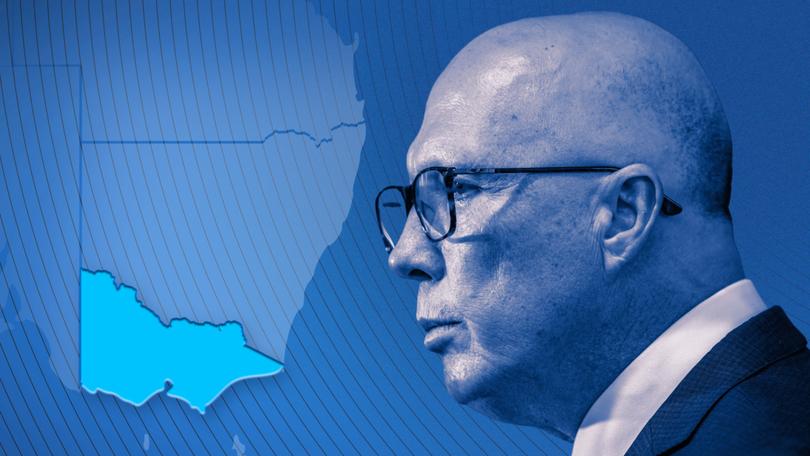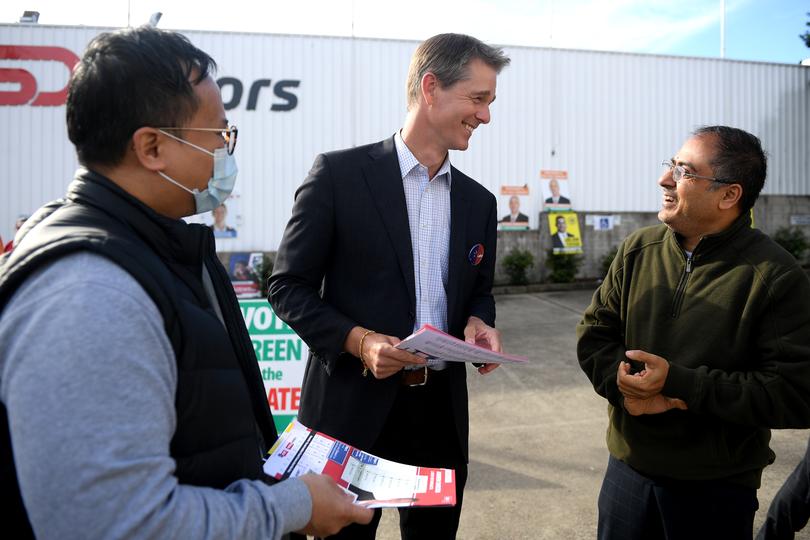Federal election 2025: On the ground, Liberal candidates find respect, not love, for Peter Dutton
Peter Dutton’s party is growing in confidence but even insiders are questioning the polls showing them heading towards majority government.

Peter Dutton, a severe ex-Queensland policeman, was never supposed to work in Victoria.
The Liberal Party leader was too conservative for the only state with an LGBTIQA+ commissioner, critics said, and only the Melbourne-born Josh Frydenberg could reverse the Coalition’s disastrous performance at the 2022 election, when its representatives were all-but banished from metropolitan Melbourne.
Voters rejected the ingratiating Frydenberg, and many, perhaps most, Victorians — tired of being ruled over by a State government of questionable ethics and basic competency — have decided they do not hate Dutton enough to stick with Anthony Albanese.
Sign up to The Nightly's newsletters.
Get the first look at the digital newspaper, curated daily stories and breaking headlines delivered to your inbox.
By continuing you agree to our Terms and Privacy Policy.Public and Liberal party polling indicates only one in four Victorians support the federal Labor Party. If that support persists to the election, which is due in the next three months, Victoria could propel Dutton into the Lodge, the prime minister’s Canberra residence.
The shift has Victorian Liberals experiencing a sensation they haven’t experienced for many years: popularity.
One candidate in a winnable Melbourne seat recently set up a community stall. Normally, Liberal candidates would be ignored by everyone but the most determined voters. This time, he found regular people willing to talk.
“It feels like a sentiment shift I’ve not experienced in my adult life,” he says.
He concluded voters are so tired of Labor mismanagement of the State — in the latest example, a minister accused the auditor-general of professional incompetence for identifying a $12 billion spending blow-out — they intend to punish the first Labor government they can, which is Albanese’s.
Another important factor is the perception a youth crime wave is sweeping through Melbourne’s once-quiet eastern suburbs. Seven years ago, Dutton, then home affairs minister, was ridiculed in Melbourne for saying Victorians were “scared to go out to restaurants” because of “African gang violence”.
Car burglaries are now so common in some suburbs that residents report being advised to leave their car keys in a prominent spot to make them easier for home invaders to see. The approach is designed to reduce the chances of a late-night physical confrontation in homes that, 20 years ago, might have been left unlocked at night.
Crime incidents measured by population in the state rose 12.5 per cent in the 12 months ended September 2024, according to the latest figures available.
Ten point lead?
Anti-Labor sentiment in Victoria is dragging national opinion polls to the right. A weekend Resolve survey of 1506 voters in The Age newspaper put the Coalition ahead by ten percentage points.
A gap that big has not been seen in a federal election since 1977, when voters were still reeling from the chaos of the Whitlam Labor government.
The margin is so big that some Liberal MPs do not believe it. Most other polls put the Coalition ahead by about four points, which would probably deliver them the most seats in the lower house, but not a majority.
A possible weakness in the Resolve poll was its estimate that 9 per cent of voters support the far-right One Nation Party. At the last election Pauline Hanson’s party received 5 per cent. How its support might have almost doubled under an immigration-sceptic opposition leader is unclear.
The Dutton do-over
What is certain, though, is many of the Liberals who turned away from the wildly unpopular Scott Morrison at the 2022 election are returning.
Much of the credit should go to a three-year campaign to make Dutton less unpopular. A willingness to articulate voters’ fears even if it subjects him to attacks from social progressives, particularly on the ABC, has helped enhance and project an image of strength. One example: his hostility towards foreign property buyers, a view seen as anti-Chinese.
Last June, Dutton overtook Albanese in a popularity measure tracked by Freshwater Strategy, a polling firm. Freshwater’s latest poll, published Monday, put him ahead by three points, although the gap is narrowing.
Liberal candidates have felt attitudes shift. Even Dutton’s plan for government-owned nuclear power stations, which many experts consider exorbitantly expensive, has convinced wavering voters he’s a conviction politician, they say.
“People aren’t expressing it in terms of love or likeability but they are talking about their respect for him,” says Trevor Evans, who is trying to win Brisbane, the seat he held from 2016 to 2022.
Brisbane and the adjacent seat of Ryan are both Greens-held, and look vulnerable. Last week’s interest rate cut will not erase two years of economic pain, and voters’ focus has shifted from global warming in the 2022 election to their personal finances.
Voluntary business liquidations are up 40 per cent in two years, according to figures published Monday by the Australian Securities and Investments Commission.
Battles over the war
Meanwhile, the Greens have evolved from their heritage as environmentalists to become members of the global anti-capitalist movement, which has also aligned them with the Palestinian cause.
Dutton’s unambiguous support for Israel is one of his defining political attributes. The electoral benefits of his support are unclear.
Australian Muslims outnumber Jews approximately eight to one. Even centrist Jewish community leaders are deeply disillusioned with Albanese and Foreign Minister Penny Wong, and hope for a Dutton victory. But the Jewish community are concentrated in seats, with the exception of Melbourne’s Goldstein, where only massive swings could win them for the Liberal Party.
Paradoxically, Islamic groups also resent the government, which they perceive as siding with the Jews. (The government supports Israel’s right to wage a defensive war, but has broken with Israel and the US on Palestinian recognition in the United Nations.)
Socially conservative and concentrated in Labor seats, it is difficult to imagine many Muslims going further left and voting for the Greens party, an enthusiastic supporter of transgender rights.
The 1.4 million members of the Chinese diaspora are a much bigger force. Unlike many Muslims, they are more likely to live in marginal seats, including Bennelong in Sydney, Chisholm in Melbourne and Tangney in Perth. (In two of the three seats, the Liberal candidates are of Chinese heritage.)
The opposition’s antagonism towards the Chinese Communist Party may not help, but its support for a stronger defence force and Israel might.
One Liberal candidate with a large Chinese population in her seat said some were worried about the rise of anti-Semitism. “They say: ‘we could be next’” she says.
Moving to Parramatta

In the previous two elections, the Coalition campaign headquarters were in Brisbane. In a sign the centre of gravity has shifted in politics, it has been moved to Parramatta, a commercial district in Western Sydney surrounded on three sides by Labor seats.
On the western side they look safe for Labor, but to the more affluent east, Bennelong and Reid could fall, and would have to for Dutton to win government. As for the seat of Parramatta, after 20 years of Labor control it looks vulnerable.
The MP for Parramatta is Andrew Charlton, an economist and former political adviser who owns a $16 million house in the city’s east. Regarded as a future minister, Charlton’s margin is 3.7 per cent. He faces one of the toughest fights of the whole election.
Charlton cannot lean on a popular leader for support. Anecdotal evidence, reinforced by polls, suggests many voters do not trust Albanese to lead Australia through what is unusually challenging time: a struggling economy, foreign wars, an unpredictable US president and an aggressive regional power in China.
Australians have not forgotten Albanese’s top priority for his first term was the Indigenous Voice, or the special treatment he received from Qantas, and the expensive seaside home he bought after 29 years in office.
“Six months ago people were saying: ‘he’s a nice guy but I’m not sure he’s really up to it’” says one Sydney Liberal MP. “Now there’s a sense of anger. Its hardened.”

